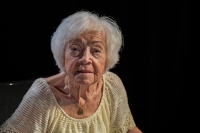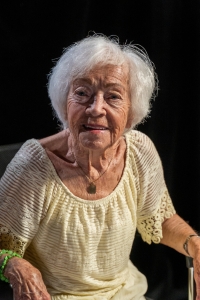I had to make a decision: either figure skating or acting

Download image
Eva Landlová was born on December 23, 1931 in Bratislava as the middle child of Katarína and Jozef Dulková. Together with her sisters Ľudmila and Hanka, she has been engaged in figure skating since childhood. The Dulková sisters’ sporting talent was noticed by Jozef Šturm, the founder of the figure skating section Športový klub Bratislava, who granted them membership in the club. Under his guidance, Eva became the champion of Slovakia in figure skating in 1948. In the club, she also met her future husband, František Landl, with whom she later performed in the Ice Revue. After Eva completed four years of study at the conservatory, she applied to study acting at the College of Performing Arts in Bratislava. Despite the fact that she successfully passed the admission interviews, she had to leave her studies in 1950. The reason for her leaving school was a politically fabricated trial, after which her father was imprisoned for four years. The Dulková family subsequently nationalized the family villa in Tehelnoé pole, and Eva got a job at a metallurgical fabrick in Košice. She was finally saved from the fate of a forklift operator by a happy accident, thanks to which Eva was able to start devoting herself to the acting profession. From 1952, she worked on the boards of the Bratislava theater Nová scéna, where she played many characters during her career. Two months before the Velvet Revolution, she retired and began to devote herself fully to dubbing. Currently, he occasionally appears in Slovak series, where he plays episodic characters.

